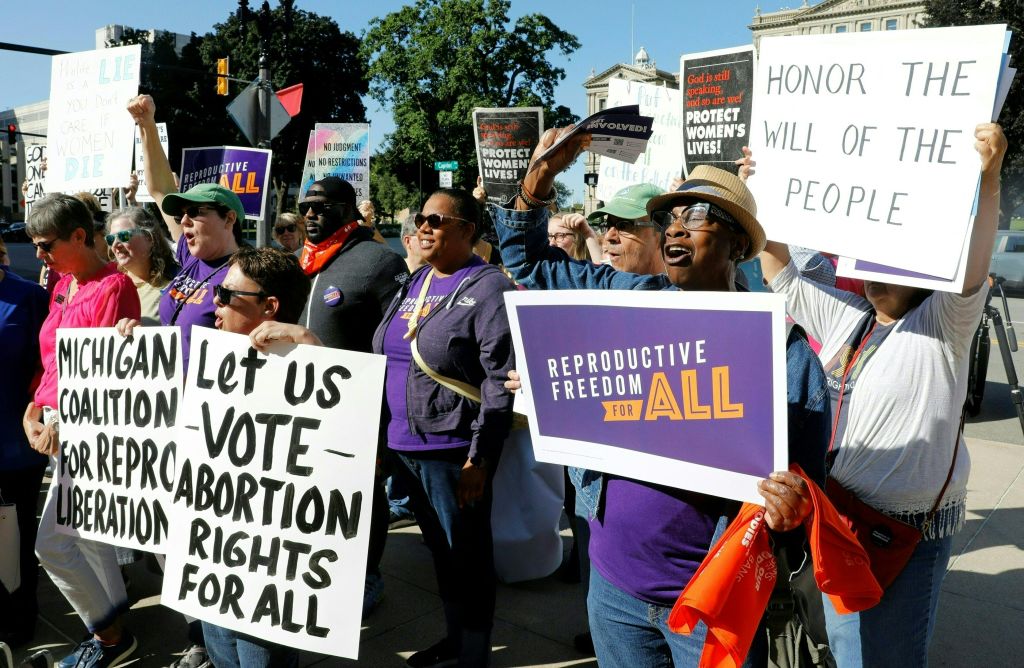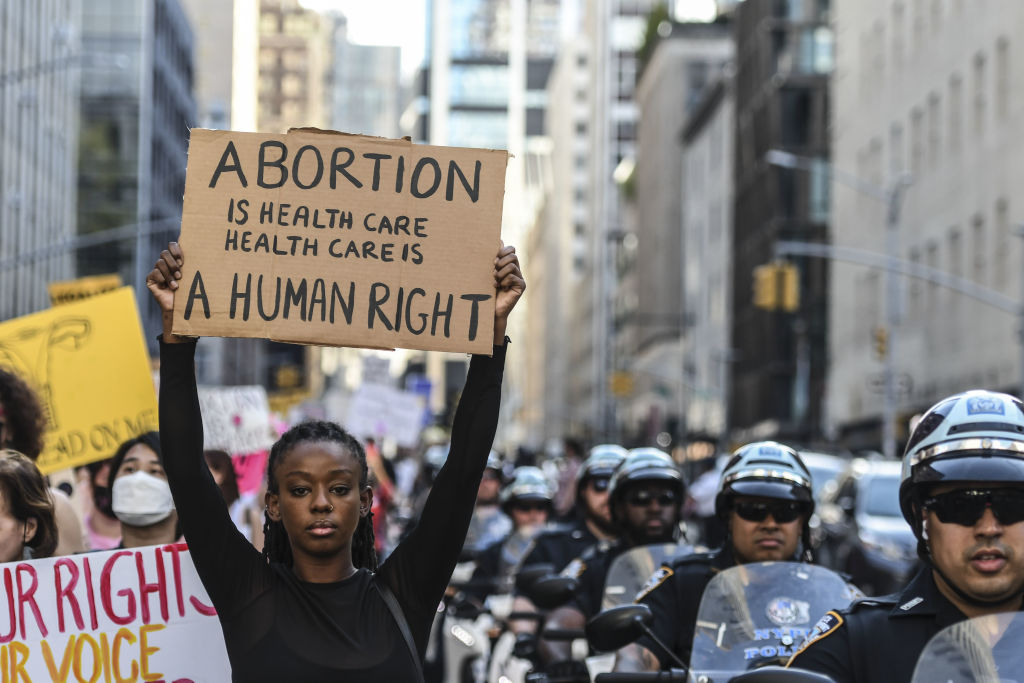The Hyde Amendment Is A Privacy Tax On Low-Income People
OP-ED: The Hidden Piece Of Hyde: Abortion Rights And Privacy Disparities

Source: JEFF KOWALSKY / Getty
On the heels of Dobbs v. Jackson, red flags about abortion and privacy rights have been raised regarding digital privacy, ringing alarm bells at the use of location services and health data by period and fertility tracking apps. These digital invasions of privacy open up larger questions about the relationship between reproductive rights and privacy.
As we mark the 46th anniversary of the Hyde Amendment—the first since Roe v. Wade was overturned—and witness anti-abortion bans across the nation, we must interrogate how the mobilization of “privacy” in defense of reproductive rights is inherently flawed.
Anti-abortion statutes in the aftermath of Dobbs, like Georgia’s HB 481 (colloquially termed the fetal “heartbeat bill”), have similarly witnessed concerns about privacy rights. HB 481 criminalizes most abortions once a fetal heartbeat is detected and expands a provision of state law that violates Georgian’s privacy rights, giving prosecutors unfettered access to patients’ private medical records without due process.
The heightened political discourse on the heels of Dobbs fails to acknowledge that for decades, low-income folks have already been faced with dismal abortion outcomes due to the privacy tax they incur. From welfare to Medicaid, in the United States, public assistance is widely conceived as an exception to citizenship rather than part of the deal. The implication is that low-income folks must trade away their political rights (privacy, due process, protection) for basic subsistence.
This privacy tax is so troublesome because privacy has been the foundational basis of legal fights for marriage equality, sexual privacy, and in particular, reproductive rights. Indeed, on Jan. 22, 1973, in the majority opinion in the landmark Roe v. Wade decision, Justice Blackmun wrote that the “right of privacy…founded in the Fourteenth Amendment’s concept of personal liberty…is broad enough to encompass a woman’s decision whether or not to terminate her pregnancy.”
The fragility of privacy would be laid bare three years following Roe when the Hyde Amendment was proposed by Rep. Congressmen Henry J. Hyde of Illinois to Section 209 of the Departments of Labor and Health, Education and Welfare Appropriation Act of 1976. Its intention? To bar the use of federal Medicaid funds for abortion except when the life of the pregnant person would be at risk.
The Hyde Amendment passed on Sept. 30, 1976, and marked the first successful legislative swing at abortion access following Roe v. Wade (1973). Following the passage of Hyde, on behalf of several other pregnant women in New York, a pregnant recipient of Medicaid, Cora McRae sued then Secretary of Health and Human Services Patricia Harris, arguing that the amendment was unconstitutional. The constitutionality of the Hyde Amendment was eventually codified in Harris v. McRae (1980), which in a 5-4 decision upheld that the original version of the Hyde Amendment was indeed constitutional and did not violate the First nor Fifth Amendments. Ultimately, the court ruled that “freedom of choice” did not guarantee a pregnant person access to the financial resources of the federal government to realize that choice.
If the right to abortion as we know it is premised on the right to privacy, and yet, the year the Hyde Amendment went into effect, abortions financed by the federal government went from 300,000 per year to a few thousand, low-income folks do not have the same access to abortion and by extension, privacy when compared to middle- and upper-class Americans.
The Hyde Amendment is yet another example of how the poor, particularly those relying on public assistance, have fewer constitutional rights to privacy. Thus, the right to privacy involved in Roe is not just constitutionally shaky, but it also reveals “privacy” as a poor substitute for liberation. Indeed, privacy is an elusive concept for marginalized groups, particularly the poor and racialized.
Although arguments oriented around privacy may have constitutional resonance, they leave a significant population of people exposed. According to a 2019 report from the Kaiser Family Foundation, 47.8 percent of nonelderly Black Georgians and 14.8 percent of nonelderly Latinx Georgians are on Medicaid. To put things in perspective, the United States Census Bureau indicates that 33.0 percent of Georgians are Black and 10.2 percent are Latinx. This means that despite making up only a third of the population, Black Georgians represent nearly half of Medicaid recipients. As for Latinx Georgians, who make up a little over a tenth of the population, they make up nearly 15 percent of Medicaid users.
Just over a thousand miles from Georgia in McAllen, TX, the tenuous (and deadly) nature of privacy rights would be revealed in 1977 in the case of Rosie Jimenez. Marked as the “first reported victim” of an illegal abortion following the Hyde Amendment, Rosie Jimenez was a 27-year-old mother and daughter of migrant farm workers from McAllen, TX. Intent on finishing college, when Jimenez discovered she was pregnant again, she sought an abortion; however, the Hyde Amendment prevented Medicaid from covering the cost of the procedure, and an OB-GYN was far too expensive. As a result, Jimenez sought the help of a midwife who was licensed to deliver babies but not perform abortions. The unsafe and unsanitary conditions surrounding the abortion ultimately led Jimenez to contract a deadly infection and die on Oct. 3, 1977, from organ failure.
Had Rosie not been a recipient of Medicaid, she would have had access to a safer abortion (through either her private insurance or personal financial resources) that allowed her to continue living. However, unable to afford a safe and legal abortion at a clinic, Jimenez was not extended the privacy rights inscribed in Roe. Her medical decision, which according to Roe, should have been contained between herself, her community and her doctor, exploded into a public tragedy. The illusory nature of privacy rights ultimately cost Jimenez her life. The fate of Rosie Jimenez is just one example of how damaging legislation based on privacy rights can be for poor folks, given that money is a precondition of privacy.
Reproductive rights have historically focused on the expectation held by white, middle-class, cishet women that their family planning and medical decisions should be legally protected. For the rest of us, privacy proves far more ephemeral. Rather than relying on privacy, we should strive for reproductive advocacy based on the tenets of reproductive justice. SisterSong’s definition of reproductive justice is rooted in personal bodily autonomy; the right to have children, not have children, and parent the children we have in safe and sustainable communities.”
As the hole punctured in Roe by the Hyde Amendment widens, privacy is not a sufficient basis to protect reproduction as it is dubious for most and totally non-existent for the marginalized. The ability to make private choices does not equal access.
Aleo Pugh (they/them) is the Georgia Communications and Cultural Strategies Manager for URGE: Unite for Reproductive and Gender Equity and a PhD Student at Emory University. They are a writer, researcher, and parent to the world’s greatest pup.
SEE ALSO:
OP-ED: To Protect Reproductive Rights, We Need More Black Women In Our State Legislatures
















